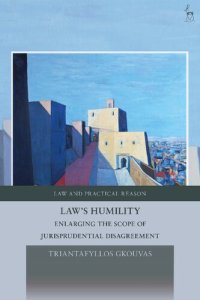
Ebook: Law’s Humility: Enlarging the Scope of Jurisprudential Disagreement
Author: Triantafyllos Gkouvas
- Series: Law and Practical Reason
- Year: 2020
- Publisher: Hart Publishing
- Language: English
- pdf
This book advances a philosophical account of a substantive, albeit less elaborated, variant of jurisprudential disagreement about which kinds of non-legal facts determine the content and the normative force of the law. At the most abstract level legal philosophers disagree about the proper methodology of jurisprudence. Opinions are divided as to whether the proper method of philosophical inquiry about law consists in refining our description of what a legal practice is or, conversely, in justifying the practice of law from a normative vantage point. Further downstream, the bulk of jurisprudential controversy centres on the concept or the nature of law. Debates in this domain are usually cast in modal or essentialist terms such that the main question becomes whether legal validity can be attributed to norms promulgated by morally wicked governments or whether by its essence law serves a moral aim.
Without suppressing the relevance of formal disputes about the methodology of jurisprudence or the nature of law, the content of the book focuses on what makes the grounds of facts about legal content and legal normativity philosophically contestable. For instance, two judges may converge in their interpretation of a particular statute or precedent but disagree about ‘the content of the law’ because they diverge in their beliefs about whether statutes and precedents are the sole determinants of legal content. Perhaps less commonly, disagreement may also erupt about the ‘force of the law’, namely, about what makes legal authority or a particular institutional arrangement practically compelling.
Philosophers of both a positivist and anti-positivist persuasion commonly refer to instances of this type of dispute about the grounding of a class of facts as ‘theoretical disagreements’. Theoretical disagreement about the content and the force of the law is used as a term of art to be contrasted with empirical and doctrinal conceptions of legal disagreement commonly encountered in the context of legal advocacy, administrative and judicial practice about whether a legal rule applies to a particular circumstance. Whereas the latter type of disagreement is resolvable by consulting the appropriate legal materials (statutes, court rulings, executive decrees etc), the former type of disagreement invites us to inquire into what grounds the fact that a legal rule or principle is applicable in a given context or, respectively, what makes it the case that this rule or principle has a binding effect on its addressees.
Volume 11 in the series Law and Practical Reason
Without suppressing the relevance of formal disputes about the methodology of jurisprudence or the nature of law, the content of the book focuses on what makes the grounds of facts about legal content and legal normativity philosophically contestable. For instance, two judges may converge in their interpretation of a particular statute or precedent but disagree about ‘the content of the law’ because they diverge in their beliefs about whether statutes and precedents are the sole determinants of legal content. Perhaps less commonly, disagreement may also erupt about the ‘force of the law’, namely, about what makes legal authority or a particular institutional arrangement practically compelling.
Philosophers of both a positivist and anti-positivist persuasion commonly refer to instances of this type of dispute about the grounding of a class of facts as ‘theoretical disagreements’. Theoretical disagreement about the content and the force of the law is used as a term of art to be contrasted with empirical and doctrinal conceptions of legal disagreement commonly encountered in the context of legal advocacy, administrative and judicial practice about whether a legal rule applies to a particular circumstance. Whereas the latter type of disagreement is resolvable by consulting the appropriate legal materials (statutes, court rulings, executive decrees etc), the former type of disagreement invites us to inquire into what grounds the fact that a legal rule or principle is applicable in a given context or, respectively, what makes it the case that this rule or principle has a binding effect on its addressees.
Volume 11 in the series Law and Practical Reason
Download the book Law’s Humility: Enlarging the Scope of Jurisprudential Disagreement for free or read online
Continue reading on any device:

Last viewed books
Related books
{related-news}
Comments (0)